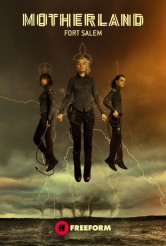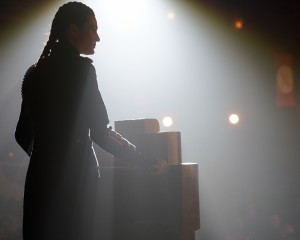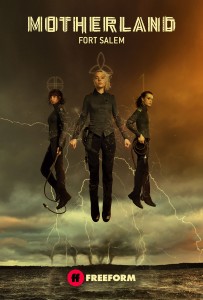MOTHERLAND: FORT SALEM flies into its second season on Freeform on Tuesday, June 22, with weekly episodes airing thereafter.
Created by Eliot Laurence, MOTHERLAND: FORT SALEM imagines a world in which the Salem witches pledged allegiance to what would become the United States Army in exchange for their lives. Led now, as then, by the unaging General Alder (Lyne Renee), the Army consists entirely of witches. All witches are legally bound to serve in the Army (they are led by women, but there are separate corps of men, with marriages intended to produce witch children), and every country in the world has its own witch military force. However, the witches of the Spree have rebelled and seek to bring down established order through acts of terrorism.
Now, though, the Army and the Spree may have to unite against the common foe of the magic-stealing, witch-hating Camarilla organization.
We see all this primarily through the eyes of three young witches who bonded into true sisterhood after a fraction start at boot camp in Season 1: ambitious military royalty Abigail Bellweather (Ashley Nicole Williams), idealistic Tally Craven (Jessica Sutton), and nonconformist but uncommonly powerful Raelle Collar (Taylor Hickson).
In an exclusive Zoom interview, creator Laurence talks about the universe of MOTHERLAND: FORT SALEM and teases what to expect in Season 2.
ASSIGNMENT X: When did you start planning the second season of MOTHERLAND: FORT SALEM?
ELIOT LAURENCE: So, I tried to do this years ago as a book series, and it was an unsuccessful venture, in the sense that I didn’t sell the book. It was very successful in the sense that I mapped out a lot of stuff that could happen. And so, in a sense, I started planning Season 2 eight years ago in terms of some big ideas, one of them being, I wanted to really create a storyline that raised the question of, “What is a witch?” So, in Season 2, there is this idea of the new witch [played by Mellany Barros], and soon enough, there are going to be testing centers, and some people don’t want to relinquish their daughters, and soon enough, it becomes a matter of great and mounting national tension. So, it’s a fun part of the season.
AX: Were the Spree and the Army always going to be moving towards working together, or did you decide that you liked the Spree and didn’t want them to be the Big Bad forever, so you made them uneasy allies?
LAURENCE: Well, I always wanted to bring dimension to the Spree, in terms of their ideology, some of which actually makes a great deal of sense. Certainly, their methods are terrifying. So, I always wanted to bring the Spree more into a gray zone. But you’re absolutely right. When faced with a larger enemy that is so terrifying, so openly genocidal as the Camarilla, what are you going to do? You’re going to join forces with your enemy for the common good, and I love stories like that. I didn’t want it to be easy, because the Army and the Spree are very entrenched in their [opposition to each other], and so it couldn’t be easy, but it is something we wanted to play with.
AX: But aren’t the Spree sort of genocidal, anti-non-witch, as it were?
LAURENCE: Not necessarily. They have used terror in terms of killing people in public places more for the volume that it gives their message, which is [that military] conscription is slavery by another name, witches should have the freedom to determine their lives, as opposed to automatically going into the service, and your kids, and your kids’ kids in perpetuity. That’s the Spree’s main gripe. If the Spree really wanted to kill people, then they could figure out a way to cause massive amounts of death. It was more using these events, like the swimming pool or the mall attack, to use the carnage to amplify the urgency of their message. Does that make sense?
AX: It does. It’s just that the Spree’s intended goals don’t always seem to match up with their actions, because, of course, what their actions would do is make the human government call even more on the witch Army to do something about these out-of-control witches of the Spree, which would make the Army even more entrenched, so …
LAURENCE: And it also makes the Camarilla’s job a little easier, because it makes witches easier to hate. So, that is the complicated position they find themselves in, for sure.

Taylor Hickson, Ashley Nicole Williams and Jessica Sutton in MOTHERLAND: FORT SALEM – Season 2 Key Art | ©2021 Freeform/David Bukach
AX: Are we going to find out more about why Raelle’s mom Willa [Diana Pavlovska] faked her own death and did what she did?
LAURENCE: Yes. We’re going to be front and center with Willa’s regret, and her defection from the Spree proper. What we’re going to learn very quickly is that there is no Spree proper, and that there is no central leadership. It’s a lot of cells that are just kind of joined around a concept, but there is not a structure. So, we’re going to learn a lot more about the Spree through Willa.
AX: Are there any characters that have popped for you that you didn’t expect to pop?
LAURENCE: I don’t know if it’s that I didn’t expect them to pop, but there are times as a show runner, when you’re going through a season, where something just becomes a light, a flame, and I think for me, this season, it was General Alder’s journey. Lyne is such a spectacular performer and actor, and the way she has brought Alder to her splendor and her severeness, but also to her humanity, is one of those things that’s just something to behold as a filmmaker. Again, I’m not surprised that Alder pops so much this year, but, wow, fasten your seatbelts.
AX: And was the Alder character always going to never eat, or did you look at Lyne Renee and go, “She looks like she never eats, so …”?
LAURENCE: She was always never going to eat. It’s something that the Biddies [witches who share Alder’s life force] do for her. But she does like wine and liquor.
AX: Are we going to see any interesting new witch abilities this year?
LAURENCE: The network [Freeform] is very careful about their shows, and we’ve gotten some feedback from our fans, and one of the things they love the most is what I like to create the most, which is the new magic, and yeah, there’s a lot of new magic this year, and a lot of very scary attack magic that we’re going to see leveled at Alder. And while these magics are very new, they are actually quite well-researched in terms of magical history and lore, and so they’re kind of a reinvention of certain occult concepts. We’ll also see the Camarilla magic, which is an approximation of what the witches do, but through these stolen vocal cords [from murdered witches], the Camarilla have figured out a way to approximate some of this stuff. And that is a sacrilege to witches, and very scary.
AX: It was implied, although not overtly stated, that the Camarilla, in addition to being anti-witch, are somewhat patriarchal. So, is that going to be explored more thoroughly?
LAURENCE: Oh, yes. Very much so. The other thing about this season that I’m so proud of and excited for people to see is, we’re going to learn much more about the Mycelium, this network of fungal intelligence that Raelle made contact with last year. As the season progresses, we’re going to figure out, we’re going to learn where the Mycelium came from. It’s going to become sort of an embodiment of the Earth Goddess. And we’re going to get a face on the Camarilla this year, so fasten your seatbelts for that. Particularly in the face of this guy, Albin Hearst, the Camarilla emerges as this sort of Abrahamic, punishing-God priest, doing battle with this Earth Mother consciousness. So, those associations are not accidental.
AX: And what would you most like people to know about MOTHERLAND: FORT SALEM Season 2?
LAURENCE: That it’s a season about examining institutions for their corruption, and for their outdatedness, and it’s about these young women that we’ve come to love, kind of remaking these systems in their own image.
Related: Exclusive Interview with MOTHERLAND: FORT SALEM actress Amalia Holm on Season 1
Follow us on Twitter at ASSIGNMENT X
Like us on Facebook at ASSIGNMENT X
Article Source: Assignment X
Article: Exclusive Interview with MOTHERLAND: FORT SALEM creator Eliot Laurence on Season 2
Related Posts:













